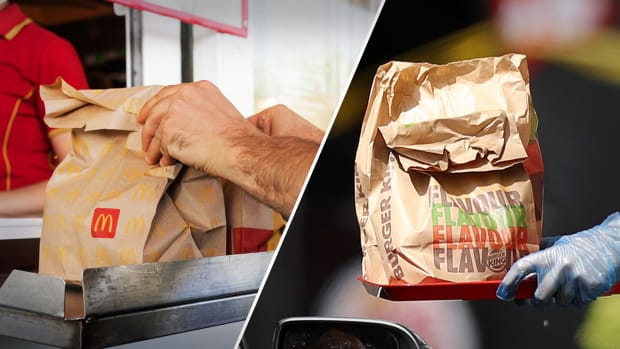In the United States, Burger King feels like a distant second behind McDonald's (MCD) in the fast-food burger race. The Restaurant Brands International (QSR) chain once had a Coke/Pepsi or Lowe's/Home Depot level rivalry and now it seems like Burger King takes the second spot more because some chain has to rather than the "Home of the Whopper" being a real rival.
Burger King, however, has pursued a steady growth strategy outside the U.S. that has made it a stronger global rival to McDonald's. That's a path of lesser resistance than trying to take on the clear leader in its home market and it's one that has been working, perhaps making Burger King more of a true rival to McDonald's.

Shutterstock/Naomi Baker/Getty Images
Burger King Grows Around the World
McDonald's has more than 39,000 stores around the world with about 18,000 of those being in North America. That means the chain has more than 21,000 locations outside of the United States, Canada, Mexico, and the various islands that make up the continent. Since 2012, however, the company has added roughly 5,300 new locations globally (including the U.S.).
Burger King has taken a very aggressive stance to its growth outside of North America, adding slightly more stores outside the U.S. than McDonald's has, including North America over the past decade.
"The success of our global development playbook is readily apparent when looking at Burger King's international growth, which includes a doubling of the brand's international store count since 2012 to nearly 12,000 locations and roughly 60% of the brands worldwide systemwide sales," Restaurant Brands International COO Joshua Kobza said during the company's third-quarter earnings call. "In multiple markets, China, France, Russia, the team effectively started from scratch, identified a strong local partner, entered into a long-term master franchise and development agreement and created a robust business with a lasting presence and continued runway for growth."
Basically, Burger King has focused on growing its global footprint rather than making its key goal unseating McDonald's in the U.S.
"In Russia, for example, through a partnership with both a financial partner and a local entrepreneur, we've grown Burger King store count from just a handful of restaurants in 2011 to nearly 800 today, almost matching the market leader," he said.
Burger King Still Has Room to Grow Globally
"Despite this robust international development, Burger King still has only half the number of restaurants globally versus the leading competitor, including only a third of the number of restaurants in Asia-Pacific, where we are building a strong foothold," the executive added. "As a result, we continue to see Burger King as a significant growth engine, and based on our current pipeline, we expect it to be the largest contributor to our net restaurant growth for the foreseeable future."
Burger King's growth has also paved the way for RBI's other brands to expand internationally.
We feel confident that the Tim Hortons brand can translate to markets all around the world, as has been demonstrated by our fast-paced growth in China, whereas many of you know, we only started in January 2019 and already expect to have over 350 locations by the end of this year. And this growth is only expected to accelerate with our partners driving a strong vision for the brand and aiming to propel Tim's China to over 2,700 restaurants by 2026.
Finally, we see opportunities at Popeyes to grow all around the world, and this year alone have signed commitments to develop some of the most important QSR markets, such as the United Kingdom, India, Mexico and Saudi Arabia, as well as expand our footprint in the U.S. and Canada, further enhancing our visibility into achieving our long-term unit growth aspirations.
International growth does not mean that Kobza does not see some opportunity in the U.S. He just sees the biggest growth coming from Popeyes not Burger King.
"The opportunity in the US is especially compelling for Popeyes," he said. "Our guest insights work shows the number one barrier to trial for the brand is convenience and with 50% of guests driving more than 10 miles to reach one of our restaurants, we see adding new locations closer to our guests as a significant long-term opportunity."







